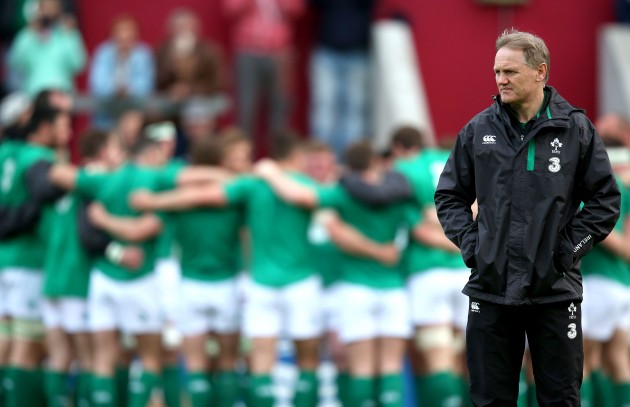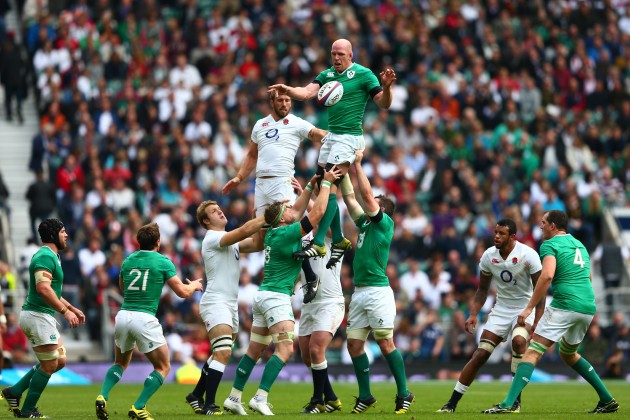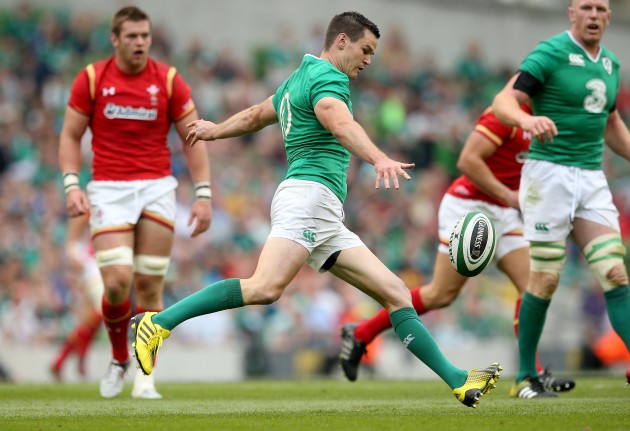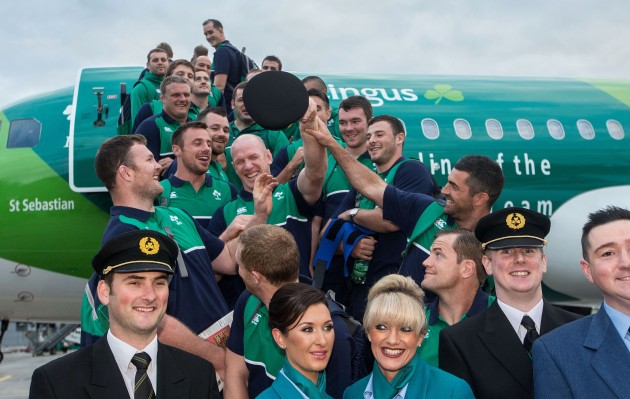Defeat to England and Wales has Irish fans panicking – but the numbers tell us that things are still going almost exactly to plan for the men from the Emerald Isle
By Mark Coughlan
It’s been a World Cup countdown of mixed emotions for Ireland fans. While England headed for Denver, Wales travelled to Qatar and their beloved Poland, and the Scots headed to the sunny climes of the Pyrenees, Ireland opted to stay at home and get a visit from Usain Bolt, for some peculiar reason. They’re back-to-back Six Nations champions, though, so why the need to flee Ireland. And after all, Joe Schmidt, like every elite Boy Scout, is always prepared.
Then came the warm-up games; an assured win over Wales, a patchy win over the Scots, then the morale-sapping defeats to Wales and England. On the Emerald Isle, that usually spells disaster – and after the debacle of 2007, and the quarter-final capitulation of 2011, you could forgive Ireland fans for getting that empty pit of the stomach feeling. But is all quite as it seems?
Joe Schmidt is a man with a plan – we all know that. The lack of accuracy in the Six Nations defeat to Wales irked him, so the gameplan against Wales and England in the last two warm-up games will have certainly improved his mood. The scoreline didn’t bear out, but Ireland meticulously stuck to the brief. In the Six Nations, Ireland had success against France and England by keeping a low error count, minimising offloads (two v France, five v England) and being neat and tidy at the set-piece (one failed lineout in each game). Contrast that with the Wales game back in March, where they lost four lineouts, and had to make 254 passes to try and breach the Wales line (compared to 116 v France and 156 v England), which naturally led to more errors. Zero clean breaks against France ended in victory, four clean breaks against Wales ended in defeat. Scratch the Scotland Six Nations game, but in recent times, Ireland don’t suit having to come out and play.
In the warm-up games Ireland stuck to the successful part of that formula, and despite falling behind, they never chased the game. In Dublin and Twickenham, Ireland managed two and three offloads respectively, while the ball was kicked away once in every 11.5 touches. Territory and defence is the mantra here – let your opponent make mistakes.
Cutting down on penalty concessions, too, was a priority after conceding 14 against Wales, and only five were conceded against England. Ireland are knitting together the masterplan one step at a time. The defeat to Wales in the Six Nations has set a benchmark for Ireland to avoid repeating – somewhere, you can imagine Schmidt waiting in a dark room with a three-line whip for anyone who tries anything too risky, or too devil-may-care. It’s not the Schmidt-in-Ireland-colours way.
Gameplan aside, Ireland clearly have the personnel to navigate choppy waters this World Cup. Experience is key, so we’re constantly told, and this side arrive with the nous and guile to do damage. The squad picked boasts 1,068 caps between them. Only Australia, New Zealand and South Africa bring more (the Springboks have just named their most-capped Test team of all time for their opener, so that’s no surprise), it is still a formidable number. New Zealand’s World Cup squad four years ago brought 1,133 caps, South Africa in 2007 had 809.
The final feather in Ireland’s emerald cap is the fact they’re playing World Cup-winning rugby, if the numbers are to be believed. Knockout rugby is rarely about try-fests, and Ireland are used to winning games despite being outscored by opponents. Consider the fact that only once in the professional era has a World Cup’s top try scorer come from the winning side (Bryan Habana in 2007), and Ireland’s lack of try machines suddenly seems less of a concern. In fact, take the group stages out of it (weaker opponents tend to skew results), and the eventual winners of the last four World Cups have been responsible for a total of 16 tries in their 12 knockout games (Australia scored four in 1999, England two in 2003, South Africa six in 2007 – including five against Fiji – and New Zealand four in 2011). That’s an average of 1.3 tries per knockout game.
Ireland won the Six Nations despite scoring just eight tries, and being outscored heavily by England (18) and Wales (13). The tournament’s top scorer was from another country. And Ireland’s try rate? 1.6. Okay, it doesn’t quite fit the World Cup winning formula just yet – but you can be sure that Schmidt will be working his socks off to make sure it does come kick off. With Canada, Romania and Italy all building up to a titanic showdown with France on 11 October, Ireland are not in bad shape. Just how much of their hand they’ve shown thus far will soon become apparent.
To see all of Rugby World’s latest subscription deals click here








